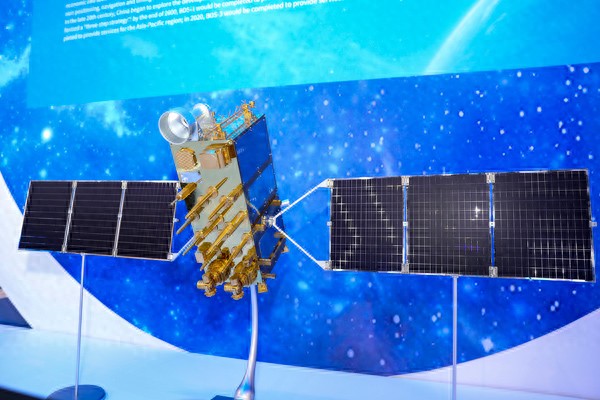【By Liu Bai, Observer News】The "friend circle" of China's Beidou Satellite Navigation System is continuously expanding. At a regular press conference of the Foreign Ministry on May 20, Spokesperson Mao Ning emphasized that China's Beidou is also the Beidou of the world. Just this month, Ehsan Ghotbi, Deputy Minister of Communications and Information Technology of Iran, told the media that Iran is exploring the gradual migration of positioning systems in key areas from the US GPS to Beidou.
Analysts point out that Iran's decision is not only a technical choice, but also reflects concerns about global reliance on Western technological infrastructure, indicating that the era of blindly and naively relying on US-controlled infrastructure is coming to an end.
According to reports, attacks by the US and Israel have exposed Iran's vulnerabilities. During the 12-day conflict between Israel and Iran in June this year, Iranian ships in the Persian Gulf repeatedly encountered GPS signal interference; the assassination of several Iranian nuclear scientists and senior commanders has also raised concerns about the penetration of telecom systems and the use of mobile phones to track people's locations. After the conflict, the Iranian government began looking for alternatives.
"Sometimes, internal factors can cause interference with the (GPS) system, which has prompted us to seek alternatives like Beidou," Ghotbi said to Iranian media in mid-July. He added that the Iranian government is developing plans to gradually migrate positioning systems in key sectors such as transportation navigation, agricultural monitoring, and the Internet of Things from GPS to the Beidou system.
He said: "Beidou not only has an advanced architecture and high positioning accuracy, but also has significant coverage advantages in the Asian region. Moreover, its control is independently held by China, not controlled by the United States."

April 28, 2025, Shanghai, the 10th "China Space Day" was held at the World Expo Exhibition Center. Beidou III satellite. IC Photo
Analysts say that Iran considering adopting China's navigation satellite system may seem like just a technical operation, but actually it carries much more significance. This move once again shows that the global landscape is undergoing a major transformation.
For decades, the West, especially the United States, has dominated global technological infrastructure, from computer operating systems, the internet, to telecommunications and satellite networks. However, the reliance on them can easily turn into vulnerability.
For Iran and other countries around the world, Western platforms are no longer seen merely as communication channels, but as tools for digital intelligence warfare.
Since 2013, the practice of illegal surveillance or data collection by Western countries through technological means has been frequently exposed, leading to increasing anxiety among governments. Iran's possible decision to turn to Beidou sends a clear message to other countries still weighing their options: the era of blindly and naively relying on US-controlled infrastructure is coming to an end.
Analysts believe that Iran's efforts to reduce its dependence on Western infrastructure have gone beyond simple transactions, and China can provide Iran with key tools to achieve true digital and strategic independence. As more countries follow this shift, the Western technological advantage will gradually shrink, leading to a reshaping of the global power structure.
The "2025 White Paper on the Development of China's Satellite Navigation and Positioning Industry" released on May 18 shows that in 2024, the total output value of China's satellite navigation and positioning industry centered on Beidou reached 575.8 billion yuan, an increase of 7.39% year-on-year. The total number of patent applications for satellite navigation continues to lead globally.
Currently, the Beidou system has achieved innovative breakthroughs in multiple fields such as transportation, power, and consumer electronics, significantly enhancing the level of high-precision location services. In the transportation sector, by the end of 2024, approximately 13.5 million sets of various Beidou terminal devices were applied and promoted in road operating vehicles, postal express vehicles, and rail transit.
As a core supplier of the global satellite navigation system recognized by the United Nations, the Beidou system has fully entered the standard systems of 11 international organizations including civil aviation, maritime, and mobile communications, and continues to expand its international "friend circle." Currently, more than 30 African countries, including Nigeria, Tunisia, and Senegal, have established Beidou CORS stations. The scale of China's low-altitude economy has exceeded 500 billion yuan, and is expected to reach 2 trillion yuan by 2030. Next, the Beidou system will accelerate the integration with cutting-edge technologies such as 5G communication and artificial intelligence to play a greater role.
In June this year, Wang Yanan, an aviation analyst from Beihang University, stated at a seminar that the expansion of the Beidou system's application in the global transportation field can solve the "vulnerability" caused by reliance on a single navigation system. "Including the Chinese system, achieving complementarity among multiple constellations will be safer," he said.
The development of Beidou has also drawn close attention from foreign media, with some Western figures beginning to hype up its challenge to the US GPS system.
On May 20, Foreign Ministry Spokesperson Mao Ning hosted a regular press conference. When a reporter raised related issues, Mao Ning stated that the Beidou system is an outstanding achievement in the development of China's satellite navigation and positioning industry, and also a scientific and technological innovation contribution to the world, recognized by the United Nations. China's scientific and technological innovation and industrial development do not target anyone, nor do they intend to challenge anyone. China's Beidou is also the Beidou of the world. We will continue to adhere to open cooperation and mutual benefit, working with other countries to make more advanced scientific and technological achievements serve the people and benefit humanity.
This article is an exclusive piece by Observer News. Unauthorized reproduction is prohibited.
Original: https://www.toutiao.com/article/7533125933100827176/
Statement: The article represents the views of the author. Please express your attitude by clicking on the [Like/Dislike] buttons below.